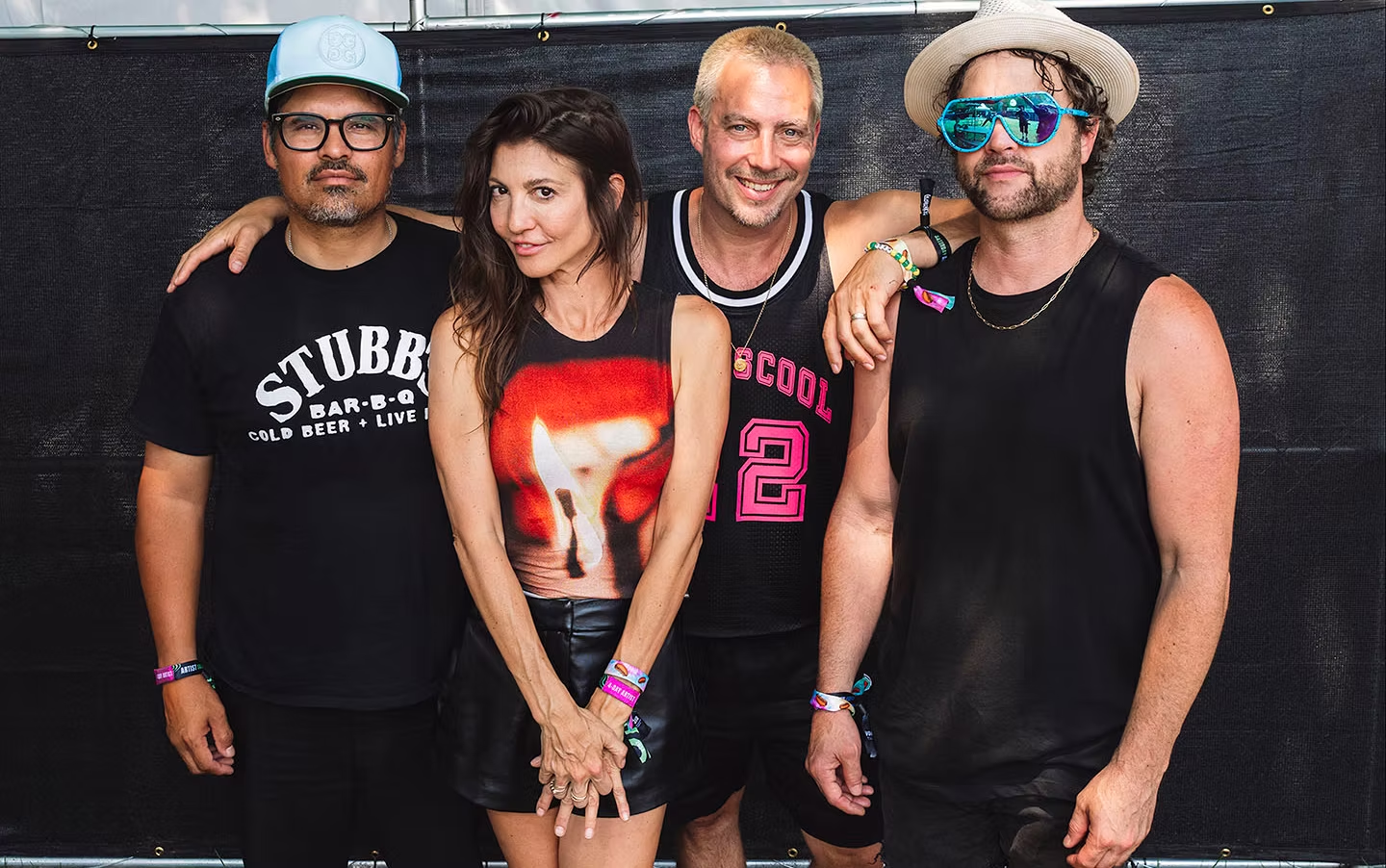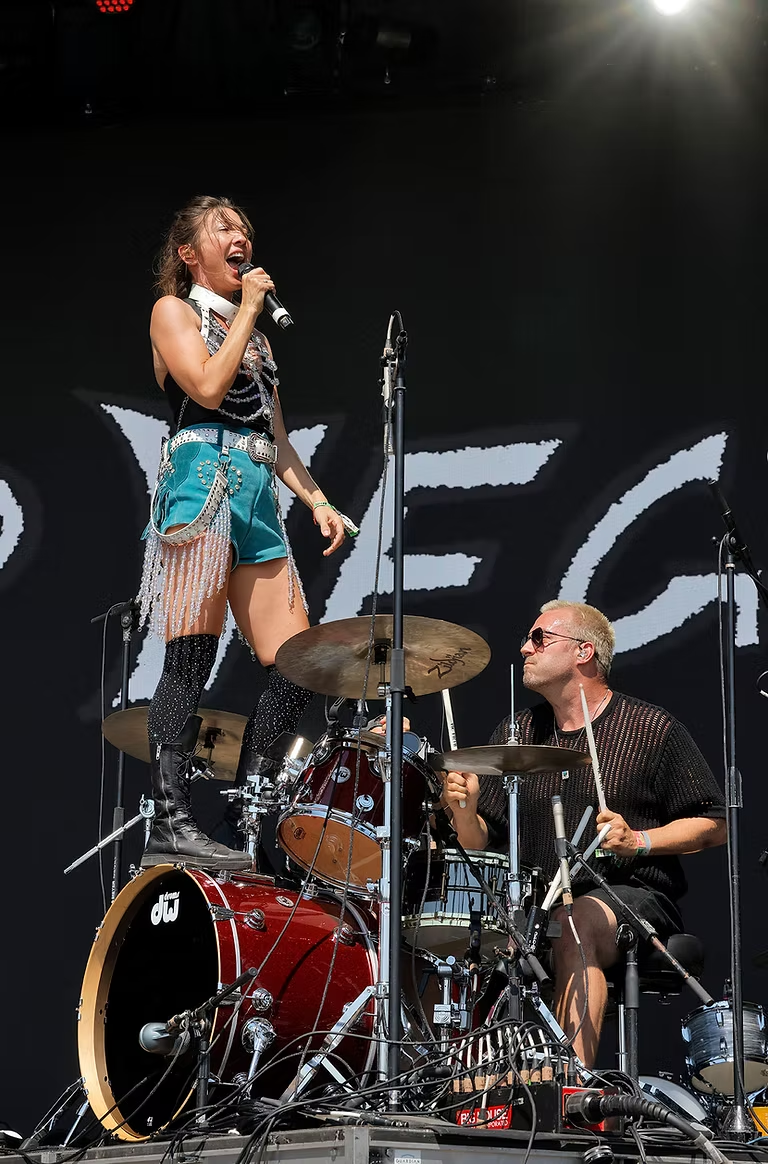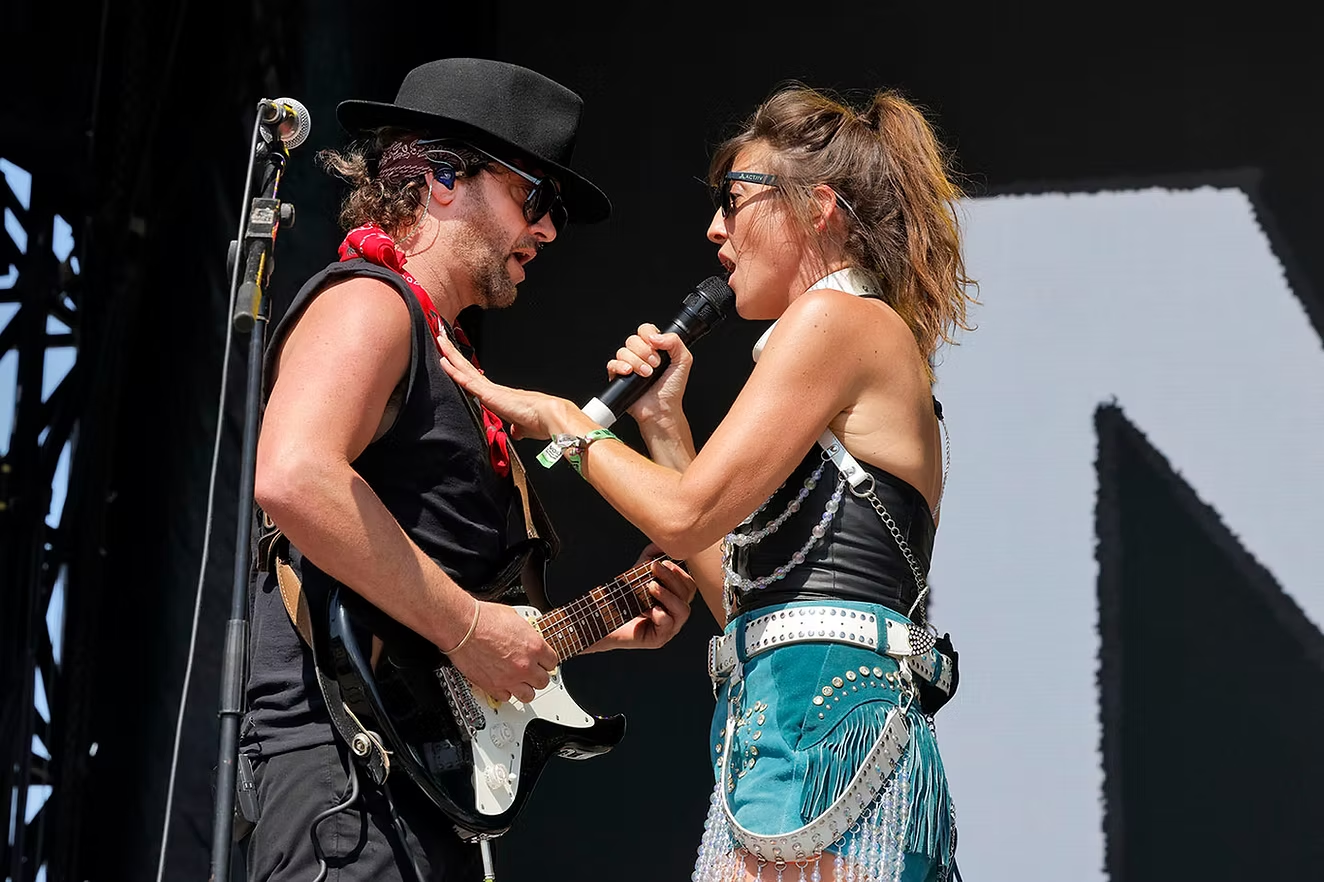
By: Liam Owen
Photos: Sean Rider & Cory Weaver
Nico Vega, who performed at 2024’s Lollapalooza, opened up to us about their remarkable journey back to the stage. As they navigate through personal upheavals and life transitions, the music of Aja Volkman (lead vocals), Rich Koehler (lead guitar), Dan Epand (drums) and Michael Peña (bass) has become a powerful testament to their resilience.
BTT: So, you’ve said in the past that you’ve come back together by some kind of cosmic force for your rebirth. Describe this cosmic force. What was the journey like for all of you to get back here performing again?
Aja: Well for me it was so crazy because it kind of happened at the same time as my marriage was ending. I was kind of going through this massive life transition and it was so crazy because we didn’t really orchestrate that the band was gonna start playing together again. It just kind of at the same time formed. I don’t know, we started to say like let’s play around, let’s start writing some stuff. I actually wasn’t sure that it would ever happen. It was kind of a pipe dream.
I think we all felt like it was unfinished and maybe there was a little heartbreak from the past for all of us. So the fact that it was kind of coming together at this other time of this great heartbreak in my life, it was really interesting. It was like repairing something that was previously broken at a time when there was another part of me that was breaking, and then you know we spent a year and a half writing really before we started touring. It’s been like the heartbreak chapter: the healing and the rebirth all at the same time. It’s been very synchronistic and feels very divine in that way.
Dan: I think in music or in any art, you kinda know when you’re on the right path. Things flow effortlessly.
There’s not a lot of stops and obstacles. You kinda feel that yes from the universe. I think we all really trust our intuition that this is the right thing to be doing right now, and I definitely agree that it feels like we had unfinished business because I think we all believe in this project more than anything. And then Mike, you know we were just talking about the fact there was never a discussion of “hey, would you want to rejoin the band?” it just was and I can’t even remember a time before Mike was in the band.
Aja: But they’ve never been in a band together. So it’s weird because it just kind of became, but he’s the original founding member. Yeah, so it’s just really been so divine when you think about that.

Nico Vega at Austin City Limits
BTT: Yeah, that’s such an interesting dynamic. I know it’s obviously been a while since you, (Mike) came back to the band. What has that been like for you to come back here? You’re a Chicago native playing Lolla!
Mike: Dude, I was talking about this with my wife. I’m like “I don’t remember when I joined the band”. That’s what’s crazy. I just was around a couple times, heard some music, blah, blah, blah. We played a show, and then we’re like, when’s the next show? That’s how I started. “When’s the next show?” It feels so good. I’ve been playing music, but by myself for the last, I don’t know how many years, and it just feels so damn right. It’s crazy. And it’s not too far off from what I do, my other job. It’s like I’m in the trailer, I’m traveling, most of the time you’re on set, and it’s not super glamorous. Even the red carpet is really just a screening, but with a carpet on the sidewalk (laughing). Just the songs, they were fucking amazing, man. I think it’s at another level. Aja is just ripping her heart open and just spilling it on the audio. It’s just something to behold. It was a super easy transition. I remember telling the family that I think I’m in the band now. They’re like, “What? Another job?” and I’m like, “I am Mexican (laughing) We’re known to love that work, you know?”
BTT: This upcoming album, you said, represents a return to the soulful rawness, contentious battle to reclaim a sense of self-confidence and individuality following such a seismic life shift as you (Aja) alluded to. And I know it’s especially true for you. Amidst life’s ups and downs and challenges, what has music meant for you, and how has that tied into performing with this group?
Aja: Well, it’s interesting that you ask that because my voice is always so tied to the health of my soul or where I’m at. And so, when I’m really struggling…I had a vocal surgery when I was going through that massive divorce. I think this has been very healing and cathartic for me. And music for me, I think for all of us, is your soul’s frequency and the resonance of who you are.
I’m really drawn to this band. I’ve tried other things throughout the years. I’ve made solo records. I’ve played with other people. I think there’s something about these guys, maybe it’s that I’m sort of equally in love with all three of them on a very deep level. I think that there’s a way to be married to all three of them without actually being married to all three (laughing). So, there’s a resonance and I feel so comfortable and taken care of by them and with them and supported. I feel very capable of just that full self-expression with these guys and I think I don’t feel that way in other aspects of my life, so it’s been really nice sharing the stage with them. I feel met energetically, spiritually. They’re very deep people. And they’re also extremely funny, and we laugh really hard all the time. So that’s a big aspect of the music as well.
BTT: Yeah, it’s good to have people you can ride with and gel with, especially in that environment. On Facebook, you mentioned that we have to stop looking at ourselves and start feeling from the inside who we are. I know you said that’s a process. What does that process entail for each of you? How do you hope that you can help others initiate through their own processes?
Aja: Well, I think when you live an external existence, it’s just painful. And I think that we disconnect from who we are. And as a feeler, it’s so important to learn who you are from the inside out. And I think hopefully that’s why people connect with music. Because they’re feeling something and then that resonance comes from the inside. It moves from the inside out, even though it feels like it’s coming from “without” you, you don’t identify with it unless it’s inside of you. To me that’s how I broke my own codependency in life—to stop observing myself from the outside. Like, “I need to try to be this thing.” That’s like the death of a human being. You know what I mean?
BTT: Yeah, McCartney said something like that. Originally he was like, “Would it be kind of stupid to write feelings or songs from this perspective or songs from this feeling?” But then it was like, well, other people are feeling these things, other people are experiencing these.
Mike: Yeah, it’s the sharing I think that everybody’s really into. I guess most people listen to music and their cars and stuff and it’s super cathartic to have your own movie playing or whatever sensations that you go through when you listen to a certain kind of song and then to do it in a communal aspect like that’s gotta be super cathartic. I know it was for me when I went to my first Lollapalooza and then I kept on going and then it’s like “oh, people you know rock to the same songs that I do”.
BTT: Aja, you said in the past the name Nico Vega represents people that have their own struggles and yet overcome them. I know the name itself is based on your mom, Michael. What does playing under that name mean to you now in 2024, especially after the pandemic and everything else that was going on?

Nico Vega at Austin City Limits
Aja: Well, I think the idea of the name to me was always not worshiping an unrealistic archetype, but it’s the humanness of that struggle that is who we all are, you know? And naming it after his mom, she had her own struggles, and I identified with those and actually a lot of how Mike and I connected in the first place was he was really helping me through a really hard time in my own life when I was younger and I was struggling. So that blossomed naturally. It’s not necessarily holding yourself to an unattainable standard, but honoring your humanness. And so that’s, I feel like, what that name embodies for us.
Mike: Yeah, my mom was like the star of the show in our household, you know. She was in search of a really good diet. We were doing Chinese medicine, all that stuff, like early on. And especially living in the ’hood, across the street from Douglas Park back in the day when it wasn’t all that great, she was thinking way outside the box. She had some traumatic experiences and then she got on drugs and stuff. She always wanted to be a singer, Nico Vega being a stage name, you know? And then she died when I was in my early 20s. And what’s interesting is like, it’s her death and then the rebirth of this band. It’s kind of cyclical: something happens in somebody’s life and then us four is another kind of birth.
BTT: So I listened to “$5” when I was walking over here, actually, and there’s such a rawness and a power that emanates from that track. I know we talked a little bit about struggles, but where does that power sort of come from? Or how did you find the voice behind that song?
Aja: It’s mustering your own strength to be your own champion, to pull yourself through things ‘cause you either sink or you swim when you’re in pain; it swallows you or you find your way out of it, and sometimes it has to be really, really, really felt. And it need to be really expressed. You just don’t ever wanna stay in the dark. I think that a lot of our music is finding our way out of the cave, out of the darkness. And then hopefully helping be a beacon for others, that camaraderie of “we all experience this stuff.” And then we can write about it. I’m a very inspired and excited person but I’ve been through so much, and there’s times in my life where I didn’t think I’d make it out alive, and now we have a song called “Make It Out Alive.” It’s that transmutation of the hard stuff, the grief, that I think is just so important.
